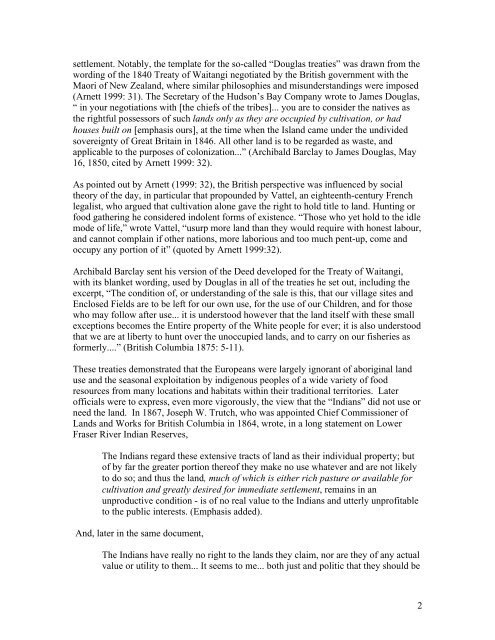Occupying the Land - Digital Library Of The Commons
Occupying the Land - Digital Library Of The Commons
Occupying the Land - Digital Library Of The Commons
You also want an ePaper? Increase the reach of your titles
YUMPU automatically turns print PDFs into web optimized ePapers that Google loves.
settlement. Notably, <strong>the</strong> template for <strong>the</strong> so-called “Douglas treaties” was drawn from <strong>the</strong>wording of <strong>the</strong> 1840 Treaty of Waitangi negotiated by <strong>the</strong> British government with <strong>the</strong>Maori of New Zealand, where similar philosophies and misunderstandings were imposed(Arnett 1999: 31). <strong>The</strong> Secretary of <strong>the</strong> Hudson’s Bay Company wrote to James Douglas,“ in your negotiations with [<strong>the</strong> chiefs of <strong>the</strong> tribes]... you are to consider <strong>the</strong> natives as<strong>the</strong> rightful possessors of such lands only as <strong>the</strong>y are occupied by cultivation, or hadhouses built on [emphasis ours], at <strong>the</strong> time when <strong>the</strong> Island came under <strong>the</strong> undividedsovereignty of Great Britain in 1846. All o<strong>the</strong>r land is to be regarded as waste, andapplicable to <strong>the</strong> purposes of colonization...” (Archibald Barclay to James Douglas, May16, 1850, cited by Arnett 1999: 32).As pointed out by Arnett (1999: 32), <strong>the</strong> British perspective was influenced by social<strong>the</strong>ory of <strong>the</strong> day, in particular that propounded by Vattel, an eighteenth-century Frenchlegalist, who argued that cultivation alone gave <strong>the</strong> right to hold title to land. Hunting orfood ga<strong>the</strong>ring he considered indolent forms of existence. “Those who yet hold to <strong>the</strong> idlemode of life,” wrote Vattel, “usurp more land than <strong>the</strong>y would require with honest labour,and cannot complain if o<strong>the</strong>r nations, more laborious and too much pent-up, come andoccupy any portion of it” (quoted by Arnett 1999:32).Archibald Barclay sent his version of <strong>the</strong> Deed developed for <strong>the</strong> Treaty of Waitangi,with its blanket wording, used by Douglas in all of <strong>the</strong> treaties he set out, including <strong>the</strong>excerpt, “<strong>The</strong> condition of, or understanding of <strong>the</strong> sale is this, that our village sites andEnclosed Fields are to be left for our own use, for <strong>the</strong> use of our Children, and for thosewho may follow after use... it is understood however that <strong>the</strong> land itself with <strong>the</strong>se smallexceptions becomes <strong>the</strong> Entire property of <strong>the</strong> White people for ever; it is also understoodthat we are at liberty to hunt over <strong>the</strong> unoccupied lands, and to carry on our fisheries asformerly....” (British Columbia 1875: 5-11).<strong>The</strong>se treaties demonstrated that <strong>the</strong> Europeans were largely ignorant of aboriginal landuse and <strong>the</strong> seasonal exploitation by indigenous peoples of a wide variety of foodresources from many locations and habitats within <strong>the</strong>ir traditional territories. Laterofficials were to express, even more vigorously, <strong>the</strong> view that <strong>the</strong> “Indians” did not use orneed <strong>the</strong> land. In 1867, Joseph W. Trutch, who was appointed Chief Commissioner of<strong>Land</strong>s and Works for British Columbia in 1864, wrote, in a long statement on LowerFraser River Indian Reserves,<strong>The</strong> Indians regard <strong>the</strong>se extensive tracts of land as <strong>the</strong>ir individual property; butof by far <strong>the</strong> greater portion <strong>the</strong>reof <strong>the</strong>y make no use whatever and are not likelyto do so; and thus <strong>the</strong> land, much of which is ei<strong>the</strong>r rich pasture or available forcultivation and greatly desired for immediate settlement, remains in anunproductive condition - is of no real value to <strong>the</strong> Indians and utterly unprofitableto <strong>the</strong> public interests. (Emphasis added).And, later in <strong>the</strong> same document,<strong>The</strong> Indians have really no right to <strong>the</strong> lands <strong>the</strong>y claim, nor are <strong>the</strong>y of any actualvalue or utility to <strong>the</strong>m... It seems to me... both just and politic that <strong>the</strong>y should be2
















